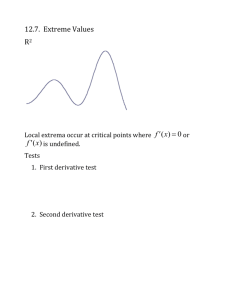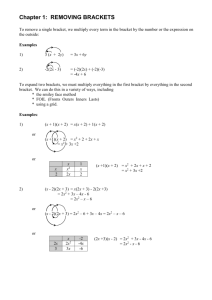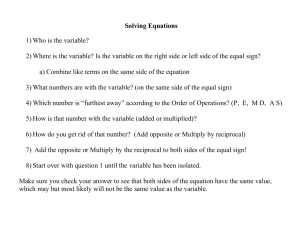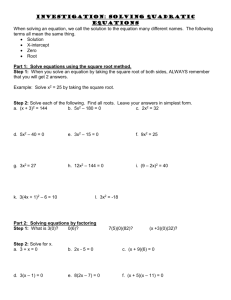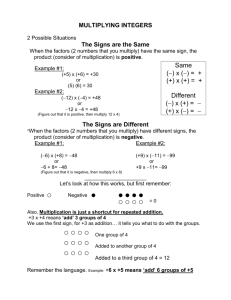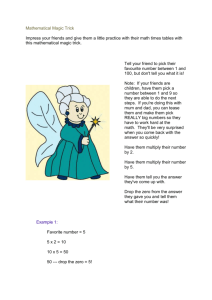Decomposition: Factoring ax2 +bx + c when a 1
advertisement
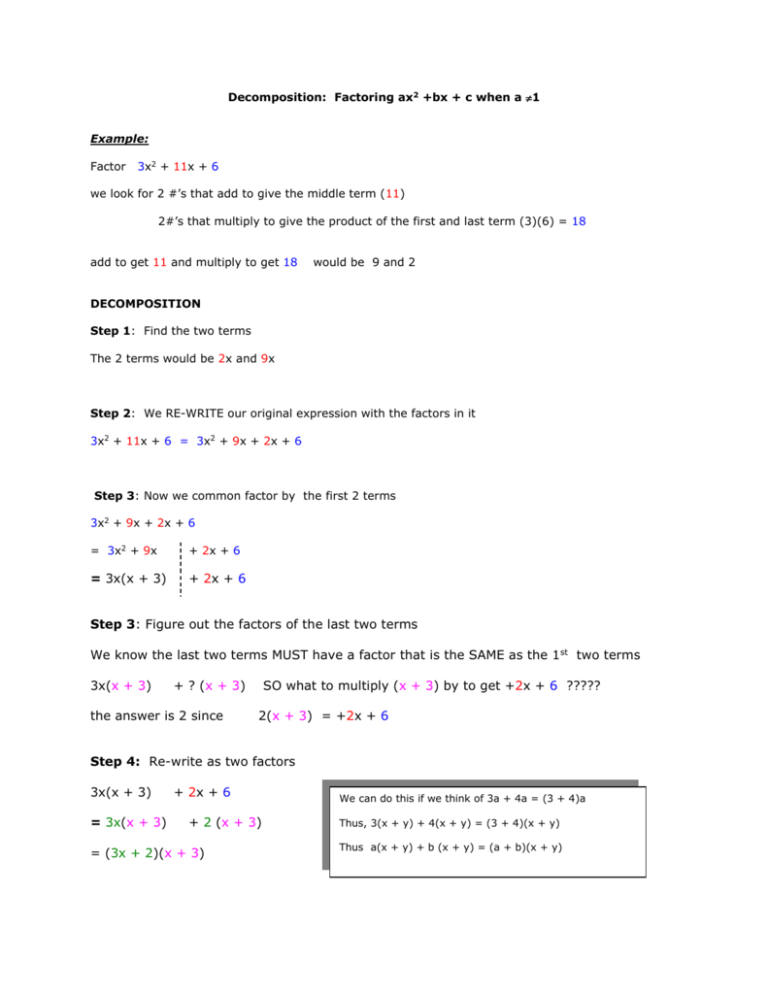
Decomposition: Factoring ax2 +bx + c when a 1
Example:
Factor
3x2 + 11x + 6
we look for 2 #’s that add to give the middle term (11)
2#’s that multiply to give the product of the first and last term (3)(6) = 18
add to get 11 and multiply to get 18
would be 9 and 2
DECOMPOSITION
Step 1: Find the two terms
The 2 terms would be 2x and 9x
Step 2: We RE-WRITE our original expression with the factors in it
3x2 + 11x + 6 = 3x2 + 9x + 2x + 6
Step 3: Now we common factor by the first 2 terms
3x2 + 9x + 2x + 6
= 3x2 + 9x
+ 2x + 6
= 3x(x + 3)
+ 2x + 6
Step 3: Figure out the factors of the last two terms
We know the last two terms MUST have a factor that is the SAME as the 1st two terms
3x(x + 3)
+ ? (x + 3)
the answer is 2 since
SO what to multiply (x + 3) by to get +2x + 6 ?????
2(x + 3) = +2x + 6
Step 4: Re-write as two factors
3x(x + 3)
= 3x(x + 3)
+ 2x + 6
+ 2 (x + 3)
= (3x + 2)(x + 3)
We can do this if we think of 3a + 4a = (3 + 4)a
Thus, 3(x + y) + 4(x + y) = (3 + 4)(x + y)
Thus a(x + y) + b (x + y) = (a + b)(x + y)
Example:
Factor
2x2 + 5x + 2
we look for 2 #’s that add to give the middle term (5)
2#’s that multiply to give the product of the first and last term (2)(2) = 4
add to get 5 and multiply to get 4
would be 4 and 1
Step 1: Find the two terms
The 2 terms would be 4x and 1x
Step 2: We RE-WRITE our original expression with the factors in it
2x2 + 5x + 2 = 2x2 + 4x + 1x + 2
Step 3: Now we common factor by the first 2 terms
2x2 + 4x + 1x + 2
= 2x2 + 4x
+ 1x + 2
= 2x(x + 2)
+ 1x + 2
Step 3: Figure out the factors of the last two terms
We know the last two terms MUST have a factor that is the SAME as the 1st two terms
2x(x + 2)
+ ? (x + 2)
the answer is 1 since
SO what to multiply (x + 2) by to get +1x + 2 ?????
1(x + 2) = +1x + 2
Step 4: Re-write as two factors
2x(x + 2)
= 2x(x + 2)
+ 1x + 2
+ 1 (x + 2)
= (2x + 1)(x + 3)
Example:
Factor
2x2 + 3x + 1
we look for 2 #’s that add to give the middle term (3)
2#’s that multiply to give the product of the first and last term (2)(2) = 2
add to get 3 and multiply to get 2
would be 2 and 1
Step 1: Find the two terms
The 2 terms would be 2x and 1x
Step 2: We RE-WRITE our original expression with the factors in it
2x2 + 2x + 1x + 1
Step 3: Now we common factor by the first 2 terms
2x2 + 2x + 1x + 1
= 2x2 + 2x
+ 1x + 1
= 2x(x + 1)
+ 1x + 1
Step 3: Figure out the factors of the last two terms
1(x + 1) = +1x + 1
Step 4: Re-write as two factors
2x(x + 1)
= 2x(x + 1)
+ 1x + 1
+ 1 (x + 1)
= (2x + 1)(x + 1)
Example:
Factor
6x2 + 11xy + 3y2
we look for 2 #’s that add to give the middle term (11y)
2#’s that multiply to give the product of the first and last term (6)( 3y2) = 3y2
add to get 11y and multiply to get 3y2
would be 9 and 2
Step 1: Find the two terms
The 2 terms would be 9y and 2y
{the only difference is the extra variable in our factoring}
Step 2: We RE-WRITE our original expression with the factors in it
6x2 + 11xy + 3y2
=
6x2 + 9xy +2xy + 3y2
Step 3: Now we common factor by the first 2 terms
6x2 + 9xy +2xy + 3y2
= 6x2 + 9xy
= 3x(2x + 3y)
+ 2xy + 3y2
+ 2xy + 3y2
Step 3: Figure out the factors of the last two terms
We know the last two terms MUST have a factor that is the SAME as the 1st two terms
3x(2x + 3y)
+ ? (2x + 3y)
the answer is 1 since
SO what to multiply (2x + 3y) by to get +2xy + 3y2?????
1y(2x + 3y) = +2xy + 3y2
Step 4: Re-write as two factors
3x(2x + 3y)
= 3x(2x + 3y)
+ 2xy + 3y2
+ 1y (2x + 3y)
= (3x + 1y)(2x + 3y)

